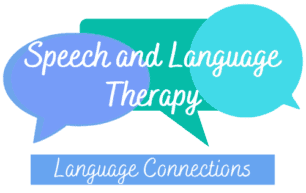Frequently Asked Questions
What is a Speech-Language Pathologist (SLP)?
A speech-language pathologist (SLP) or speech therapist, is a skilled professional who diagnoses and treats speech and language disorders. The field of speech-language pathology is very diverse, as SLPs can specialize in everything from feeding and swallowing disorders to reading intervention.
What is the Difference Between Speech and Language?
Speech refers to verbal means of communicating. It encompasses things such as voice, fluency, and pronunciation of specific sounds. Speech difficulties can occur for a number of different reasons and a simple speech evaluation can help determine what’s wrong and how to treat it.
Language, on the other hand, is composed of socially shared rules and includes understanding and use of vocabulary, manipulating words to form new words, formulating sentences, and using appropriate sets of words for specific situations. A language evaluation should be conducted if your child presents with difficulties in any of these areas.
When Should My Child Start Talking?
In the first year of life, babies go from babbling to playing with sounds, copying sounds and putting sounds together. First words might start at around 12 months.
By 24 months, your child should have at least 100 words and begin stringing two word combinations together, such as, “Daddy go,” “Want ball,” or “More milk.” By age 3 they should have over 200 words.
If your child is not speaking consult a speech pathologist who can help teach a child how to communicate meaningfully. A speech pathologist can help your child use the “tools” of language to build connections with others.
What is Articulation?
Articulation is the formation of clear and distinct sounds in speech. Standardized assessments for language samples can determine if your child has age appropriate sounds.
In regards to intelligibility of age appropriate sounds a common guideline is that children should be intelligible (easily understood) 50% of the time by age 2, 75% of the time by age 3 and 100% of the time by age 4.
If your child is missing sounds that are age appropriate a speech pathologist can support the development of these sounds.
How Long Do Your Assessments Typically Last?
Our assessments are conducted during the session and can range from 15 minutes to an hour.
Our assessments are standardized according to developmental norms and are individualized to each client’s unique needs (e.g., is assessment needed to qualify the child for in district school therapy services, are parents seeking an independent evaluation to be used in a court case, etc)
What is Apraxia?
Apraxia of speech (AOS)—also known as childhood apraxia of speech (CAS) when diagnosed in children—is a speech sound disorder. Someone with AOS has trouble putting sounds together to make words.. AOS is a neurological disorder that affects the brain pathways involved in planning the sequence of movements involved in producing speech. The brain knows what it wants to say, but cannot properly plan and sequence the required speech sound movements. Treatment for Apraxia involves explicit instruction in teaching the child to slow the pace of their speech and breaking sentences down into individual sounds that are practiced over and over until the sentence is mastered.
What is Auditory Processing Disorder?
Children with APD may exhibit a variety of listening and related complaints. For example, they may have difficulty understanding speech in noisy environments, following directions, and discriminating (or telling the difference between) similar-sounding speech sounds. Sometimes they may behave as if a hearing loss is present, often asking for repetition or clarification. In school, children with APD may have difficulty with spelling, reading, and understanding information presented verbally in the classroom. Often their performance in classes that don’t rely heavily on listening is much better, and they typically are able to complete a task independently once they know what is expected of them. A multidisciplinary team approach is utilized with APD as treatment. Each case is highly individualized and a speech pathologist can help refer to an audiologist if needed.
What is Evidence-Based Practice?
- Clinical expertise/expert opinion
- The knowledge, judgment, and critical reasoning acquired through your training and professional experiences
- Evidence (external and internal)
- The best available information gathered from the scientific literature (external evidence) and from data and observations collected on your individual client (internal evidence)
- Client/patient/caregiver perspectives
- The unique set of personal and cultural circumstances, values, priorities, and expectations identified by your client and their caregivers
When all three components of EBP are considered together, clinicians can make informed, evidence-based decisions and provide high-quality services reflecting the interests, values, needs, and choices of individuals with communication disorders. Speech pathologists are an evidence based practice and will only utilize strategies that have proven successful results.
Does Insurance Cover Speech Pathology Sessions?
Most insurance companies offer an allotment of speech therapy sessions per calendar year in their plans. I am considered out of network with insurance companies but I do offer a superbill that has diagnostic codes that you can submit to your insurance.



